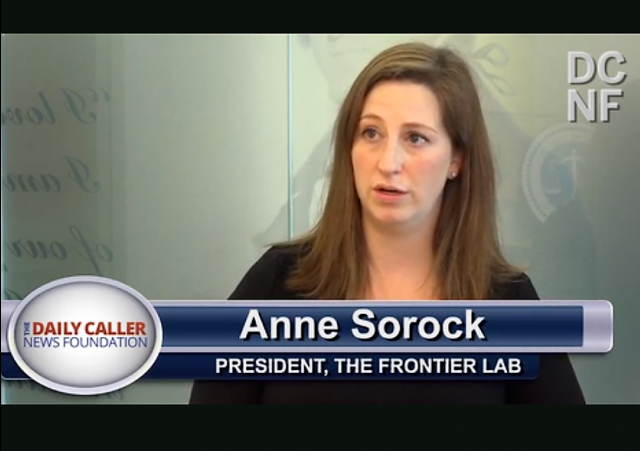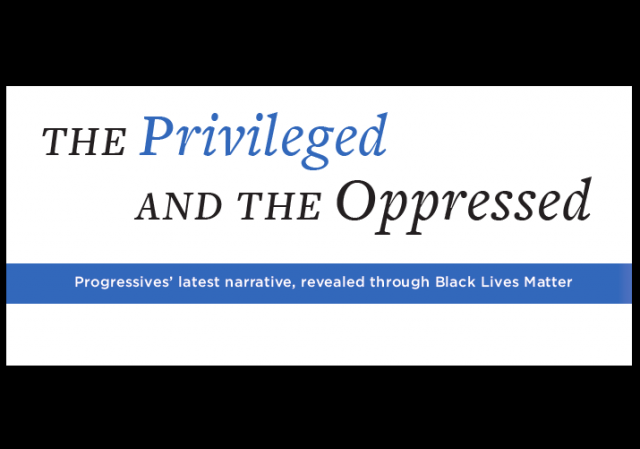Frontier Lab Tag
“Why 2020 Is the Year Women Fight for Trump (and he should keep tweeting)”
Researcher: Trump supporters still want The Wall
Research Guru saw Trump phenomenon coming before anyone else
“Deep Values” Profile of core Legal Insurrection readers
Research Report: #BlackLivesMatter more about radical social upheaval than “Black Lives”
Yale and Mizzou’s Snowflake Protesters would say they’re defending freedom
National Right to Life hits home run where it counts, Buzzfeed
National Right to Life posted a wonderful, poignant, and likable defense of life today, and you can breathe a sigh of relief: it works, beautifully. Not only is it relevant and lighthearted while delivering an important message, it does so without trying too hard. And --...
Anne Sorock radio interview: Why Republicans won’t call themselves Republicans
The Frontier Lab's Switching Behavior study, which identified four core events that preceded disaffiliation from the Republican label, has been picked up by everyone from Sarah Palin and Sean Hannity to Vicki McKenna Yesterday morning, I joined Philadelphia's Rich Zeoli show to discuss the study's findings -- and...
New study sheds light on why Republicans won’t call themselves Republican
This week, The Frontier Lab published the results of months of research into why some Republicans are refusing to go by the label "Republican," choosing to identify as anything but. I was the Research Director for this study, which applied a research approach called "Behavioral...
Founding Fathers and Tea Party still favorites with advertisers
Think the Tea Party's disappearing? Not according to advertisers, who featured the theme in two ads broadcast in the prime final moments of Monday's Boston v. Chicago NHL finals game. FiatUSA takes the continually on-trend Founding Fathers theme as the centerpiece of its "Italian Invasion -...
With Cosponsor.gov, Eric Cantor joins growing crowd of marketer-legislators
Noticed the trend of legislators going beyond issuing press releases and fully embracing social media to distribute and market their point-of-view? Rep. Darrell Issa has been especially active in marketing himself and his committee's activities, including design-heavy graphics and an active twitter account. Today Rep. Eric Cantor's...
War of the Taxpayer Shakedown infographics
April, the month when the sting of the government's overreach is most acute, provided the backdrop for a series of infographics illustrating just how onerous the tax burden (and fiscal irresponsibility) is to our country. Groups like the Cato Institute, AFP, Illinois Policy Institute, and...
A behavioral scientist examines Sequestration logic
A professor at Harvard has applied her behavioral science background to the use of the "sequestration" tactic in an article, "The Strange Behavioral Logic of the Sequester Stalemate." She uses the somewhat forced nature of the upcoming automatic spending cuts and compares elements of the situation...
War of the Sequestration Infographics
There's a surplus of pretty successful infographics attempting to sway audiences as to the meaning--and import--of sequestration cuts.
From political groups like Third Way and The Democratic Daily to a Quaker organization and the Cato Institute, there are common themes running through many of the depictions that attempt to both explain the term "sequestration," while also selling a viewpoint. The infographics from those opposed to sequestration focus on what, and even more strikingly, who, will be impacted according to their points-of-view. On the other hand, an infographic from the Cato Institute focused on placing the cut amounts in perspective--and using humor.
For example, National Parks Service presents perceived impact on jobs, and converts figures into "equivalents," saying "proposed cuts to NPS budget would be equivalent to close 200 of the smallest park units":
The Third Way attempts to reach out across the aisle to Tea Party activists, choosing issues they think are interesting to them and applying their left-leaning ideological POV:
Democratic Daily goes straight for the jugular, illustrating the impact on children:
Me or We: Stanford study concludes self-interest wins out over society’s
A study entitled "In the Land of the Free, Interdependent Action Undermines Motivation" published this month from Stanford University researcher MarYam Hamedani concludes that appeals to community motivation, what they call "interdependence," are less compelling than independent behaviors when addressing social challenges. In other words, if you're...
Grocery chain banning all products marketed to children with cute cartoon characters
A Washington, D.C., area organic grocery store chain is banning all food items marketed to children with cartoon characters, according to a report on Food Navigator-USA. MOM's Organic Market founder Scott Nash called using cartoon characters on items like cereal boxes or snacks "sleazy" and...
Supporters distract from Benghazi with familiar Hillary narrative and an animated GIF
Hillary Clinton continued to get the meme treatment this week with columnist Zerlina Maxwell's posting of a series of GIFs, or animated pictures, that instruct how to deal with "mansplainers." The GIFs used footage from the Benghazi hearings to take emphasis away from the content of...
- of 2
- 2
Donations tax deductible
to the full extent allowed by law.
CONTRIBUTORS
- William A. Jacobson
Founder
- Kemberlee Kaye
Sr. Contrib Editor
- Mary Chastain
Contrib Editor
- Fuzzy Slippers
Weekend Editor
- Mike LaChance
Higher Ed
- Leslie Eastman
Author
- Vijeta Uniyal
Author
- Stacey Matthews
Author
- Jane Coleman
Author
- James Nault
Author
- Mandy Nagy
Editor Emerita
- Learn more about the Contributors

















